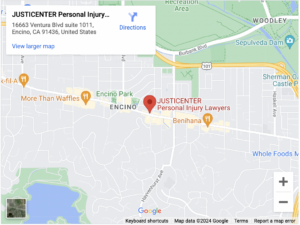JUSTICENTER Personal Injury Lawyers | February 19, 2024 | Car Accident Lawyer Near Encino California

In the aftermath of a car accident, it can be easy to forget one of the most important steps to take: reporting the crash. Filing an accident report may be the last thing on your mind after a traumatic event like a traffic collision. However, failing to report the incident can not only cause you to lose opportunities for compensation, but it can also come with serious legal consequences.
Our attorneys understand the importance of timely and accurate reporting to protect your rights. In this blog post, we’ll delve into the key aspects of car accident reporting in California.
When Should I Report a California Car Accident?
Reporting a car accident should be done as soon as possible after the incident occurs. Prompt reporting allows law enforcement authorities to document the scene, gather evidence, and ensure the safety of everyone involved.
Under California Vehicle Code (CVC) § 16000, drivers must report an accident if:
- The accident resulted in property damage exceeding $1,000, or
- Anyone was injured or killed.
However, it is difficult to know the extent of damage or injuries at the time of the accident, so it’s best to report the crash anyway.
The specific time frame for reporting a car accident may vary depending on state laws and the circumstances of the collision. In California, drivers are generally required to report accidents to the Department of Motor Vehicles (DMV) within ten days.
However, according to CVC § 20008, if the accident results in injury or death, the driver must file a written report with the police within 24 hours. If the accident involves a company car, under CVC § 16002, the driver must report it to their employer within five days.
Do I Have to Report a Car Accident in California?
In many cases, you are legally obligated to report a car accident to the appropriate authorities. While you may not need to report a minor collision (e.g., involving no property damage or injuries), it is hard to know right away whether the accident had those impacts. That is why, even for minor accidents, it is best to report.
Failure to report an accident may result in legal consequences and complications.
According to California law, some potential consequences include:
- Revocation of driving privileges by the DMV
- Fines ranging from $1,000 to $10,000
- Up to a year in jail or up to four years in prison, depending upon the circumstances
In addition, collision reports can provide valuable evidence if you bring a claim for damages later, whether for bodily injury, property damage, or emotional distress. These reports serve as official documentation of the incident and can verify details that you have included in your claim.
How Do I Report a Car Accident in California?
To report a crash, you can call 911 or fill out a car accident report form, which can typically be obtained from your local police department, sheriff’s office, or DMV. The form requires detailed information about the accident, including the date, time, location, parties involved, and a description of the damages.
According to CVC § 20010, the driver must make the report. However, if the driver is incapacitated and unable to report, that responsibility falls on any passengers of that car.
The car accident report should be filed with the appropriate law enforcement agency in the jurisdiction where the collision occurred. This may be your local police department, sheriff’s office, or the California Highway Patrol (CHP) if the accident happened on a highway or interstate. You can use the SR-1 reporting form.
A California Car Accident Lawyer Can Help You Obtain Your Crash Report
Reporting a car accident is a critical step in the aftermath of a collision. Our experienced attorneys are here to guide you through the car accident reporting process and advocate for your rights.
Contact the Encino Car Accident Lawyers of JUSTICENTER Personal Injury Lawyers for Help Today
Please contact an experienced Sherman Oaks car accident attorney at JUSTICENTER Personal Injury Lawyers for a free initial consultation today at (833) 852-3600.
Our main office is in Encino, CA, but we serve all through Los Angeles County.
JUSTICENTER Personal Injury Lawyers
16633 Ventura Blvd suite 1011,
Encino, CA 91436

